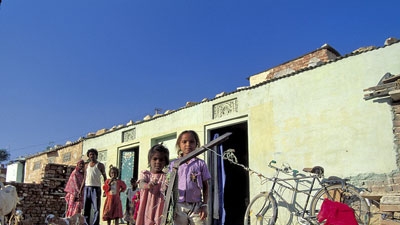Reducing malnutrition remains a global policy challenge. Poor nutrition in childhood damages health and stunts cognitive and physical development, making it hard for children to reach their potential. Although early childhood stimulation programs to improve interactions between particularly mothers and their babies have shown success, policymakers need more information on how these programs can be delivered effectively and cost effectively in different countries. The results of this evaluation will offer new evidence from India and Pakistan about how to improve nutrition and children stimulation by working directly with mothers and their households.
| SIEF cluster: | Early Childhood Nutrition and Development |
| Country: | India and Pakistan |
| Evaluation sample: | 24 clusters in India and 20 in Pakistan |
| Timeline: | 2012-2017 |
| Policy tools: | Home visits, stimulation, nutrition information |
Context
India and Pakistan both have an enormous number of children at risk for poor development because of malnourishment and lack of appropriate stimulation when they are young. The Sustainable Program Incorporating Nutrition and Games, or SPRING, uses home visits by community-based health workers to improve development. In both countries, SPRING is being implemented in concert with government programs that support child development, and the results of the evaluations will help policymakers in India and Pakistan better understand what is effective and scalable.
Intervention and Evaluation Details
Intervention
SPRING promotes cost-effective home visits by community-based agents to pregnant women and mothers of children up to two years old. SPRING gives lessons in the best childcare practices, including infant and young child feeding, mother-child interaction and play, and encourages family support and involvement. It also aims to develop an effective monitoring and supervision system to support these visits.
In Pakistan, the SPRING program is offered during monthly home visits by government-appointed Lady Health Workers, who are female health workers assigned to mainly rural areas. The program will be implemented in the Rawalpindi District in Pakistan’s northeast.
In India, the SPRING program will work alongside the government’s community-based program that uses semi-volunteers to visits homes and provide assistance and information to mothers of newborns. The program will appoint community women to implement the child development and nutrition intervention. SPRING in India will be implemented in Rewari, a predominantly rural district of Haryana in the north.
Evaluation
The evaluation is a cluster randomized controlled trial. In India there will be 12 intervention and 12 control clusters, with an estimated 11,000 mothers and their babies receiving the program; in Pakistan there will be ten intervention and ten control clusters, with an estimated 5,000 mothers and their babies receiving the program. Beneficiaries will be all pregnant women and all households with a child under the age of two. Mothers and their babies in the control groups will all receive the current services provided through the government’s child program.
Baseline assessments are collected as mothers register for the program, and follow-up assessments include those taken when a child reaches one year and 18 months. Data will be presented separately for boys and girls.
Policy Impact
The evaluation will not only generate information on the impact of the trial, but will also provide policy makers with knowledge of the key components, coverage, costs, system requirements and programmatic efforts needed to deliver an integrated community-based intervention to an expanded clientele. Evidence generated will be relevant to other developing countries that area also addressing early childhood development challenges.
Researchers:
- Betty Kirkwood, London School of Hygiene and Tropical Medicine
- Bilal Avan, London School of Hygiene and Tropical Medicine
- Atif Rahman, University of Liverpool
- Jose Carlos Martines, World Health Organization
- Raghu Lingam, SPRING
- Zelee Hill, University College London
- Gauri Divan, Sangath
- Siham Sikander, Human Development Research Foundation
- Shamsa Zafar, Health Services Academy
Partners:
